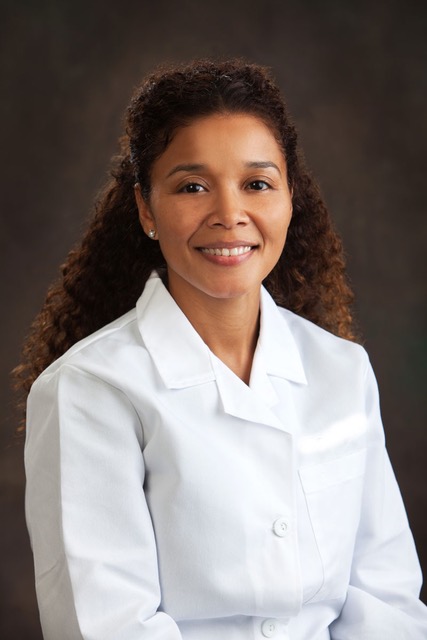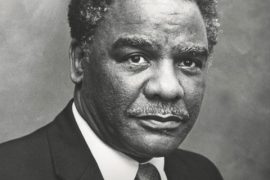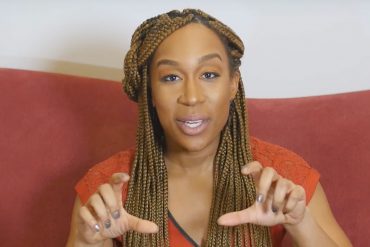Dr. Willie Mae Jackson M.D., M.A. is a prime example of a Chicagoan truly living her dream despite experiencing many adversities in her life, which also served as her catalyst to specialize in and work in the field of Forensic Psychiatry.
Born and raised on the west side of Chicago, Dr. Jackson is a product of the city’s public school system. Raised in a single-parent household, she had extra support from mentors, extended family, and friends that encouraged her to see her dreams of being a doctor come to fruition.
Dr. Jackson has always understood the importance of understanding behavioral sciences and medicine in the African-American Community. She has published articles focusing on mental health in the underserved communities of Chicago. She completed her forensic psychiatry fellowship at Northwestern Feinberg School of Medicine and has had the privilege of being mentored by world-renown Community Psychiatrist Dr. Carl Bell (to which they have 2 articles in print).
She recently released her debut novel, a psychological thriller entitled Make It Right, that has received rave reviews.
Currently, Dr. Jackson is working on improving access and reducing the stigma of mental health in underserved communities and college settings throughout the city of Chicago. In addition, she is dedicated to pushing forward with her promotion and advocacy of empowerment and educating the masses on the importance of good mental health.
N’DIGO recently caught up with Dr. Jackson to discuss her background, hot new book, and take on the violence plaguing Chicago.

N’DIGO: n your own words, who is Dr. Willie Mae Jackson?
Jackson: Willie Mae Jackson is a very down-to-earth, free-spirited, resilient black woman.
Tell us about your background and where you grew up and went to school?
I was born and raised on the west side of Chicago. I attended Chicago Public Schools my entire academic career. I went to William H. King Elementary. Sadly, it was one of the schools on the chopping block that was closed and now there are condos on the ground that it once stood. I then went to Manley High School and college at the University of Illinois Chicago. I majored in Psychology, but I was Pre-Med. I also minored in Theater. Theater was something of an outlet for me to kind of just be free and have an escape from the constant competition in the Pre-Med classes and just from that Pre-Med culture overall.
I went on to attend graduate school at Roosevelt, where I received a master’s degree in Clinical Psychology. I knew I still wanted to go to medical school and decided on Ross University Medical School. It’s a medical school based in the Caribbean but you come back to the States to finish your last two years and do a residency. I did my residency at the University of Louisville and then I did my Forensics residency fellowship at Northwestern here in Chicago.
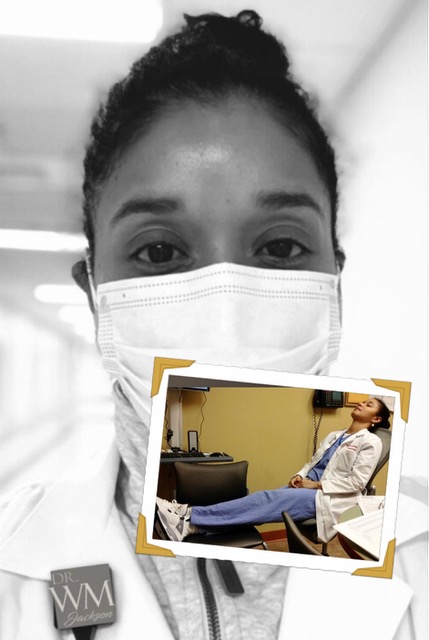
Did you always know you wanted to be a Doctor?
I’ve known that I wanted to be a physician since I was maybe 5 years old. I used to have asthma and would have to go to Cook County Hospital back in the day, the children’s hospital. I used to love seeing the doctors walk around the hospital. One day one of them gave me one of those Fisher-Price toy doctor kits, and oh my goodness, that was it! I knew then it’s what I wanted to do. When I got old enough to drive, I’d always drive past UIC in the Medical District. Every Saturday, my grandfather used to go to the Jewel (grocery store) that used to be where the Student Services Center is now on Halsted and Harrison. I’ve always been curious and always wanted to step outside of what I saw on a day-to-day basis, and medicine had always remained a common denominator as far as a goal that I needed to achieve for myself.
Can you tell us about your specific area of expertise and practice?
I’m an adult and forensic psychiatrist, so I treat mental illnesses with adults ages 18 and over, and then I am also a subspecialist with specialty expertise in forensics. Forensic Psychiatry is the study of psychiatry in the law. So it’s the integration between mental health, not just mental illness, but mental health overall and its applications into the legal system. There are two areas; civil and criminal. I tend to focus on the criminal aspects of forensics. I testify in court, determine if someone is fit to stand trial, understand their Miranda rights, conditional releases, and things on that spectrum. I’ve also done some work on the civil side on cases dealing with malpractice and things like that. One of the vast differences between forensic and adult psychiatry is an adult psychiatrist, and I have a doctor-patient relationship established. As a forensic psychiatrist, there’s no doctor-patient relationship. It’s pure evaluation and rendering an opinion based on the legal question that I’m asking. So it’s really interesting because I get to treat patients in a community setting and then evaluate them as a non-doctor-patient relationship. Then I also treat patients in correctional settings. So I get to see a transmission for people’s lives on many different levels.

How do you maintain your work/life balance?
It’s definitely not always easy. I’d say probably 65% of the time I feel like I have a balance that works but that other 35% is definitely freestyled. I really try my best to have a regimen and routine where I can still have time to enjoy for myself. Also, quality time with my son is of the utmost importance. Then there are times where I have so much going on that I have to force myself to just stop and take care of myself, even if it means just simply doing something relaxing or making sure I get some exercise in. I try to maintain a good routine where I’m primarily making myself accountable for taking the time to have some R&R.
What does your self-care look like?
My self-care routine as of late is when I wake up in the morning I make sure to take some time before I jump out of the bed and hit it. I may lay there for a moment with my eyes open just looking up at the ceiling or out the window. I always need that time to gather myself and then I meditate and have a glass of water. I’ll get up and stretch a bit before having a good breakfast and coffee. I’ve also recently begun to incorporate exercising in the morning but going on with my busy day. Most of my self-care happens in the morning. And then in the evening time, I start winding down maybe about 9 pm and trying to disconnect from the day. Disconnect from electronics…and just really focusing on something that’s going to relax me so I can go to bed.
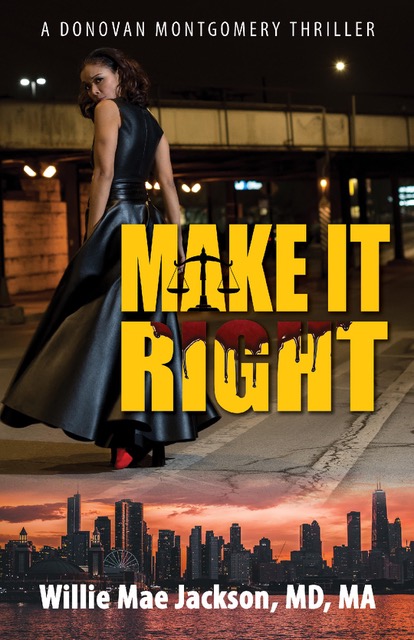
Let’s get into your book, Make It Right. Would you please tell us the inspiration behind it and how it came about?
I’ve always been interested in criminal behavior and trying to understand what leads people to do the things that they do. How and why individuals are able to go to dark places and still adapt to their environment. I had that basic premise that I’ve been curious and fascinated with for many years. Of course, you know being a forensic psychiatrist, I have a certain unique perspective on things as well. Having experiences with different levels of criminology and its applications in mental health definitely pushed things along. I’ve gotten to learn about behaviors through experts that I otherwise would not have had access to if I were not a forensic psychiatrist.
It’s a lot of very difficult information that can manifest itself in other ways like dreams or just being stuck at the front of your mind all the time. So writing the book also allowed me to kind of unload some of the emotional angst that I had pent up. It allowed me to release some of that stuff and also create an interesting character. I had yet to come across any books that I really felt captured that aspect of things. I felt I could bring that to reality based on not just what I do for a living, but also using the imagination that I’ve always had over the years while thinking about these characters. Also, I tapped into how I was introduced and participated in theater, and that helped open my eyes to different levels of creativity. They’re still fictional characters that can still somewhat be relatable. And I wanted to make sure that when I created a lead protagonist such as Dr. Donovan Montgomery that this is also someone that people can recognize and say “Hey, there’s somebody that looks like me and is also educated!”
That’s the perfect segue about the book. Without giving away too much, can you tell the audience what it’s about?
Yes, it is a fictional psychological thriller. Dr. Donovan Montgomery is a forensic psychiatrist based in Chicago. I wanted to make sure that Chicago was a character in the book as well. Dr. Montgomery would be considered a high-profile forensic expert. When there are high-profile cases like mass shootings or murder-suicides with a political undertone or political involvement, she’s the go-to forensic psychiatrist for either side: both the prosecution and the defense. Most of the time, however, she’s on the prosecutory story side. She assists the courts to understand how they should move forward with defendants who have committed crimes but maybe their mental illness has now been put into question. Her expert testimony helps influence the judge’s opinion. Always under pressure, she’s a go-getter and very driven. She has some personal challenges of her own that she has managed to suppress for quite some time but she starts to unravel as she continues to take cases that she believes in but the results of these cases are often unfair and unjust. Her goal ultimately is to make things right but with making things right she’s going to face her own demons.
Did you kind of draw inspiration for this character from anyone we may know?
When I was younger, I used to love Pam Grier in “Foxy Brown“. Foxy was beautiful and strong and she didn’t take any nonsense. One of her biggest assets was her ability to be a chameleon. She was able to look many ways, act many ways, and speak many different ways. My aunt loved all those movies and I hung out with her a lot so I ended up loving them as well. I also thought about different people that I’ve been around my whole life. I think Dr. Montgomery has character traits of some of those people. Some I grew up with and some I haven’t spoken to in years but were still impactful on my life in some way. She’s really a composite of a lot of people.

As someone who works near and around the justice system, what thoughts do you have regarding the surge in violence in Chicago?
That’s definitely a loaded question, and there are multiple layers to unravel there. One is access to care. When you shut down mental health organizations and limit access to care, people begin to self-medicate. Sometimes through illicit drugs and through gambling, overeating, and any other type of behaviors that have become excessive and impact people’s ability to function. So you have issues with access to care, and then we also have to think about the economics of being impoverished, you know? We also have to think about not just access to mental health services but also access to programs. You have people who don’t have a sense of direction and don’t have a place to go. Then there is the violence and individuals getting continuous access to firearms. We have to address where the guns are coming from.
So I would say those things: access to health care and mental health, access to programs/after-school programs. Also, access to mental health services includes addiction. The younger generation and their abuse of illicit/designer drugs seem to be an epidemic. There was a time when it was just marijuana, but now we’re these kids addicted to codeine and ecstasy and molly and all of these things. And the political aspect of it seems to be in gridlock too. Where are our elected officials? So I think we have to get back to basics, and you have to go to the people to understand what’s going on in the community. You’re not going to understand it from hotlines or people filling out surveys.

What is something most people would be surprised to know about you?
I know how to whistle really well. Like I can whistle songs in their entirety, and you’d be able to sing along to them.
Aside from your own, what’s the last great book that you read?
I recently re-read an oldie but goodie….”The Souls of Black Folk” by W.E.B. DuBois.
Do you have a favorite quote or affirmation?
The Serenity Prayer – “God grant me the serenity to accept the things I cannot change, courage to change the things I can, and wisdom to know the difference.”
What I take from it is I just have to accept things for what they are that I cannot change and all I can do is change myself. I want to make sure that I ask for favor and mercy and the insight to know the difference between the two and trying to find that balance. I say it all the time because it really helps me to reduce any anxiety and excessive worry. I just say that mantra and also Psalm 23.
Best advice or words of wisdom?
Listen to yourself. Listen to your passion. Follow what you believe you can be, and don’t believe naysayers. What people tell you, you’re not going to become. Sometimes you may fail, and people will try to discourage you from trying again but don’t listen to them. I was told many times, that I should think about doing something else because my scores were not the best to get in medical school. The standardized exam, Medical College Admissions Test (MCAT), wasn’t the best but I continued to persevere and I saw it through. So dream big and don’t give up. No matter what, you have to believe in yourself.
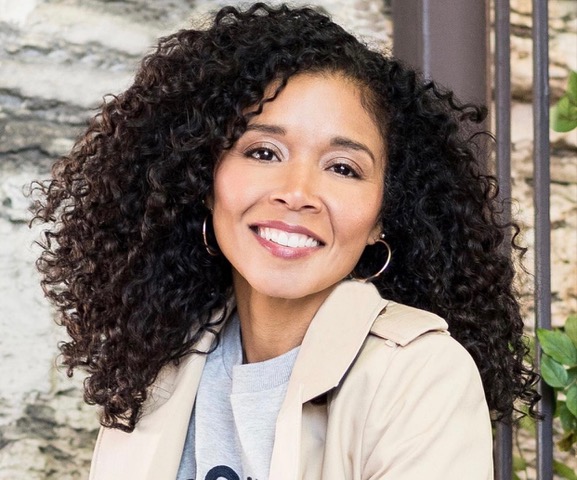
What’s next for Dr. Willie Mae Jackson?
Right now, I’m working on my second book and have decided to turn Make It Right into a trilogy, so I’m pretty excited about that. So that’s in the works, and as always, my goal is to continue to spread mental health awareness on my social media platforms. My ultimate goal is to establish some mental health care services in the inner city of Chicago within the next couple of years.
For more information on Dr. Willie Mae Jackson, please visit www.drwmjackson.com and connect with her on Facebook and Instagram.


